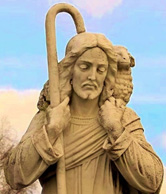Wisconsin Bishops – Faithful Citizenship Resources
The Wisconsin Catholic Conference (WCC), the public policy voice of Wisconsin’s bishops, has an abundance of Faithful Citizenship resources, including a letter from our state’s bishops. These resources can be accessed here.
Resources from the U.S. Conference of Catholic Bishops (USCCB)
Our U.S. Bishops have also provided a wealth of resources for forming consciences for Faithful Citizenship. These can be accessed here.
“Responsible citizenship is a virtue, and participation in political life is a moral obligation.”
U.S. Bishops, Forming Consciences for Faithful Citizenship, n. 13
Wisconsin Catholics, please VOTE on or before Nov. 5 (early voting begins Oct. 22). Learn everything you need to know about how, when, and where to vote (and to be sure you are registered to vote), as well as what is on your ballot, by visiting www.myvotewi.gov.
To learn where the candidates stand on the issues, there are multiple websites that may be of help. Here are three of them (there are many more):
- ivoterguide.com (Faith-based source)
- vote411.org (Secular source)
- votesmart.org (Secular source)
Politics, Voting, and Christian Faith

As Christians, we do not leave our faith behind when we engage the world of politics and elections. We understand that politics, like every other part of life, must be illuminated by God’s light or we will stumble in the dark. A generation ago, a large majority of Americans shared this view. Call it the Classical Christian worldview. It was the common foundation for our social and political life; we assumed it like the ground beneath our feet. Today, however, that foundation is under attack from another worldview, one that rejects God, or at least disregards him, as it makes the self supreme. Let’s call it the Radical Selfist worldview.
The Classical Christian Worldview
The Classical Christian worldview holds that we have received our lives as a gift from a God who loves us, and that we are accountable to him. It believes in moral laws that God has written on our hearts and clarified through his revelation. This is his blueprint for us, his design for our happiness and fulfillment. This blueprint reveals to us certain foundational moral principles. Among them, we see:
- That every human life, of every race and nation, born and unborn, is sacred, with equal rights and dignity;
- That we are created male or female according to God’s plan;
- That sexual relations are meant for marriage between one man and one woman;
- That religious freedom and the rights of conscience are sacred.
Though we are imperfect human beings, we work to build our lives on foundational principles such as these, as we raise our families and shape our social and civic communities.
The Radical Selfist Worldview
The Radical Selfist worldview opposes everything we have just described, rejecting the idea of a God-given blueprint. Everything is up to personal ‘choice.’ We can choose our own gender, our preferred exercise of sexuality, our definition of marriage, and even whether a child in the womb shall live or die. Radical Selfism preaches tolerance until it gains power, at which point it seeks to intimidate, silence and punish those who disagree with it. Unfortunately, this worldview has been promoted by many in Hollywood, mass media, and big tech. It has also infected substantial segments of corporate America, the education system, and government.
Political Consequences
Sadly, the current political landscape essentially forces us to choose between these two worldviews. This choice has significant consequences at every level of government, from the White House and Congress to State and local officials and school boards. The most telling indicator of Radical Selfism is advocacy of abortion, by which man steals from God the very power over life and death. By far the gravest human rights violation of our time, abortion has cost the lives of more than 64 million unborn babies in our nation. Thankfully, the recent Supreme Court decision reversing Roe v. Wade has returned abortion law to the states. But abortion advocacy continues with its deceitful buzzwords and slogans, closing its eyes to the life of the child in the womb. Moreover, abortion is inevitably clustered with other positions favored by the Radical Selfist worldview.
What is a Christian to do?
While we cannot expect perfection from any political candidate, it is vital that Christians support those most closely aligned with the Classical Christian worldview, and oppose those aligned with the Radical Selfist worldview. For Radical Selfism, with its worship of ‘choice’ in place of God, inevitably produces bitter fruits: moral and civil breakdown, destruction, and death. It is simply impossible to achieve lasting harmony and peace without adhering to the foundational principles of God’s plan. Therefore, let us be courageous witnesses to the Gospel, and pray tirelessly that God might heal our nation and lead us in his ways. And let us intensify our efforts to elect candidates with the courage to stand up for the God-given principles and rights on which our nation was founded. Our future, and the future of our children and our grandchildren, is at stake.
Note: The Diocese of La Crosse does not endorse candidates or parties, but strives to help form consciences for faithful citizenship.
To obtain Politics, Voting, and Christian Faith
as a flyer or bulletin insert, click here.
Comparing Republican and Democratic Party Platforms


